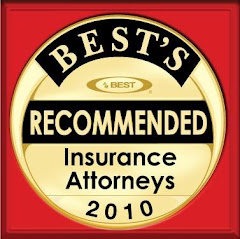As Seen on Nolo.com
If you've suffered a serious work-related injury or illness, it's almost always a good idea to hire an attorney to handle your workers' compensation claim and ensure that you get all the benefits to which you’re entitled. But you need to find an attorney with specific expertise in workers' comp. Because this area of the law is complex and highly specialized, clients are generally not well served by attorneys who try to dabble in workers' comp.
Unfortunately, it's not always easy to distinguish the workers' comp experts from the dabblers. Television commercials, Internet marketing, billboards, and print ads often contain more style than substance. The most reliable indicators of a quality attorney—years of experience, depth of knowledge, attention to detail, trustworthiness—are seldom apparent in an advertisement. While it might take some extra effort to find the right attorney for you, it can make all the difference in your case. Here are some tips to help you in your search.
Ask for recommendations from friends, colleagues, and family members. Many good workers' comp attorneys do little to no advertising, instead relying on word-of-mouth and referrals from satisfied former clients. State and local bar associations and legal aid offices may be able to provide referrals as well. You're much more likely to find quality counsel through a referral than by responding to an ad and hoping for the best.
The Internet can be a great resource, but use it wisely. As is true for people searching for any kind of service provider, many injured workers find workers' comp lawyers online, including through Nolo's Lawyer Directory. But, particularly if you’ve identified potential attorneys through online ads or popular review sites, you should look for more information. Study the prospective attorney’s website to see if it emphasizes workers' comp expertise, or if the practice appears to handle a wide variety of cases. Does the website contain articles or other information about workers' comp law? Are there testimonials from former clients? Does the firm appear to have a long and successful track record? While you shouldn't base your choice of attorney entirely on a website, it can still be a useful indicator of a lawyer's level of knowledge, experience, and professionalism.
Treat the initial consultation as your lawyer's job interview. Virtually all workers' comp attorneys offer free initial consultations with prospective clients. While your lawyer will certainly ask you dozens of questions related to your claim, you should be asking just as many questions. Remember: This is a job interview, and you are the employer. The following questions will help you gauge the attorney's level of expertise in workers' compensation:
How many years have you been handling workers' compensation claims?
How much of your practice is devoted to workers' comp?
Can you represent me throughout the entire workers' comp process, including at administrative hearings and appeals, as well as in court if it gets to that stage?
Can you provide me with any references, such as former clients and/or colleagues in the legal community?
Will you be working on my case personally, or will legal assistants and paralegals handle the bulk of the work?
If I call your office with a question about my case, will I speak to you or a legal assistant?
Do you also represent employers and insurance companies in workers' comp cases, or only injured workers?
Are you a member of any professional organizations in the field of workers' compensation law? Are you board-certified in workers' comp?
Can you explain to me how a workers' compensation claim proceeds through the system? How do attorneys' fees work?
Will I be charged for litigation-related expenses, and if so, what do those expenses include? Will I be charged even if my case is unsuccessful?
Do you arrange for clients to receive consultative medical examinations with appropriate specialists? Under what circumstances?
How do you estimate the value of my case? What are the strengths and weakness of my case?
Look for an attorney who inspires confidence and treats you with respect. The initial consultation is a great time to evaluate the attorney's professionalism and demeanor when dealing with clients. A quality attorney will answer all your questions patiently and authoritatively and will listen to and address your concerns. If you have to meet with three or four (or more) attorneys before finding one who inspires complete confidence, that's a relatively small price to pay.
Also take note of the attitudes and behavior of the administrative assistants, legal assistants, and paralegals in the office, as you'll probably be interacting with them on a regular basis. If they treat you rudely or dismissively or don't return your calls promptly, feel free to take your business elsewhere.
As your case progresses, your attorney should provide you with periodic updates on the status of your claim. If you rarely hear from your attorney, speak up about your concerns. If that doesn’t help, it may be time to find a new lawyer who will give your case the attention it deserves. (Before you take that step, however, learn about the consequences of switching workers’ comp lawyers during your case. And learn more about what a good workers' comp attorney should do for you.)





